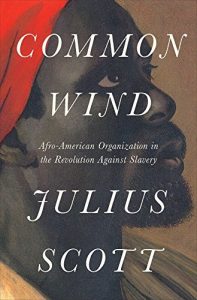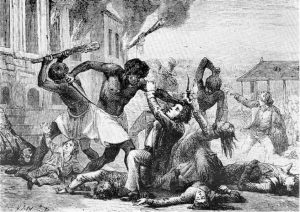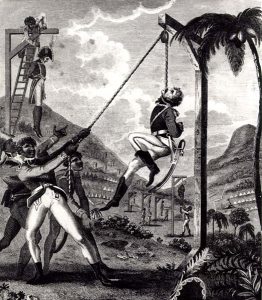
The Common Wind: Afro-American Currents in the Age of the Haitian Revolution.
Julius S. Scott. Foreword by Marcus Rediker.
Verso. 272 pp. $34.95.
This apparent new golden age of the surfacing of hidden classic Africana works continues with a history-from-below study so powerful that, more than 30 years after it was first written as a heretofore-unpublished doctoral dissertation, it has been the subject of a two-day conference. Scott pours through correspondence and proclamations of empires French, Spanish and British, spanning from the 17th to the early 19th centuries to find the naked fear that European slave-holding societies had of African revolt. But that is not half the story. The real excavation news is of how powerful Africans were: that, in the years before and during the Haitian Revolution, they developed sophisticated underground networks of communication that connected British Jamaica, French Saint-Domingue, and America’s New Orleans.

As the Foreword writer Rediker notes, the port city is the central loci of this intellectually bold, masterfully crosshatched work. It the site of exchange and commerce–the two main keywords here. Commercial and/versus political. Slave and free, captain and sailor, Maroon and planter, newspaper publisher and illiterate corsair. Who is who, and what are the agendas behind of all of these socially fluid and color-filled connections? Only The Shadow (of history) knows, and this is what worries the owners of those respective ports, French, the Spanish and the British. The European powers, at war with each other, have one important priority, as their representatives attempted to manage their particular enslaved ground: try to keep information about both French Revolutions–the one led by the white Radical Republicans against their brothers and the one underway from “French Negroes” fighting against some other white Frenchmen–far, far away from those most in want and need of it. An example, as Scott discusses the interaction between sailors and the enslaved/free: “The constant and shifting stream of seafaring folk provided the masterless [a term Scott uses to describe freemen and freewomen] underground in the colonies with a crucial transatlantic connection. As developments in Europe began to affect the future of slavery in the colonies, these sailors brought with them reports of great interest to both slaves and their owners. By 1790, British sailors arrived with news that an anti-slavery movement was gathering momentum in England, while French seamen wearing tricolored cockades [the emblem of a Revolution supporter] had even more exciting stories to tell of political developments in France.” And when these stories–along with government decrees restricting or eliminating slavery, pamphlets and newspapers–got to the enslaved, rebellions violent and non resulted.

Scott has been so applauded for this extraordinary synthesis its publication more than 30 years after its reference-library-shelf appearance is almost an epilogue. But it is important because once again, a wedge of Africana historiography is filled, and formerly insider-illumination is now made accessible; this “new” work exists to take its place within the old, to keep the historical continuum open-sourced. Through his diligent research and sober analysis, Scott shows two important certainties from the age of empires past and perhaps present. The first: oppressed human beings will always fight for their individual and collective liberation, every day and in every way, period. The second is not so much that truth is vertical (as in, crushed to Earth and rising again) but more that truth’s very nutrients–new information–were, and still are, constantly horizontal, flying from place to place through the air, person to person, ever invisible and unstoppable.
-30-
Todd Steven Burroughs, Ph.D., is an independent researcher and writer based in Newark, N.J. He is the author of Warrior Princess: A People’s Biography of Ida B. Wells, and Marvel’s Black Panther: A Comic Book Biography, From Stan Lee to Ta-Nehisi Coates, both published by Diasporic Africa Press. His 2014 audiobook, Son-Shine On Cracked Sidewalks, deals with the first mayoral election of Ras Baraka, the son of the late activist and writer Amiri Baraka, in Newark.
Before 1790 there was the Somerset decision of 1772 in England that discussed the abolishment of slavery due to slave revolts. This decision was one of many reasons the settlers in the colonies revolted. Gerald Horne’s book ” The Counterrevolution of 1776″ goes into detail of the events leading up to 1776. Thanks for the book review and keep up the good work.